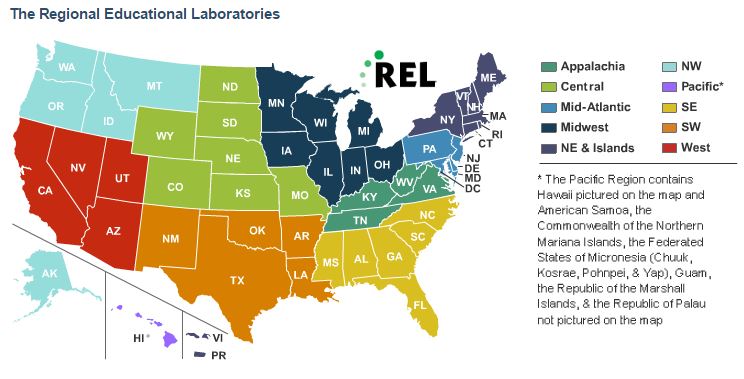By Joy Lesnick, Acting Commissioner, NCEE
Welcome to the NCEE Blog!

We look forward to using this space to provide information and insights about the work of the National Center for Education Evaluation and Regional Assistance (NCEE). A part of the Institute of Education Sciences (IES), NCEE’s primary goal is providing practitioners and policymakers with research-based information they can use to make informed decisions.
We do this in a variety of ways, including large-scale evaluations of education programs and practices supported by federal funds; independent reviews and syntheses of research on what works in education; and a searchable database of research citations and articles (ERIC) and reference searches from National Library of Education. We will explore more of this work in future blogs, but in this post I’d like to talk about an important part of NCEE—the Regional Educational Laboratories (RELs).
It’s a timely topic. Last week, the U.S. Department of Education released a solicitation for organizations seeking to become REL contractors beginning in 2017 (the five-year contracts for the current RELs will conclude at the end of 2016). The REL program is an important part of the IES infrastructure for bridging education research and practice. Through the RELs, IES seeks to ensure that research does not “sit on a shelf” but rather is broadly shared in ways that are relevant and engaging to policymakers and practitioners. The RELs also involve state and district staff in collaborative research projects focused on pressing problems of practice. An important aspect of the RELs’ work is supporting the use of research in education decision making – a charge that the Every Student Succeeds Act has made even more critical.
The RELs and their staff must be able to navigate comfortably between the two worlds of education research and education practice, and understand the norms and requirements of both. As part of this navigating, RELs focus on: (1) balancing rigor and relevance; (2) differentiating support to stakeholders based on need; (3) providing information in the short term, and developing evidence over the long term; and (4) addressing local issues that can also benefit the nation.

While the RELs are guided by federal legislation, their work reflects – and responds to – the needs of their communities. Each REL has a governing board comprised of state and local education leaders that sets priorities for REL work. Also, nearly all REL work is conducted in collaboration with research alliances, which are ongoing partnerships in which researchers and regional stakeholders work together over time to use research to address an education problem.
Since the current round of RELs were awarded in 2012, these labs and their partners have conducted meaningful research resulting in published reports and tools, held hundreds of online and in-person seminars and training events that have been attended by practitioners across the country, and produced videos of their work that you can find on the REL Playlist on the IES YouTube site. Currently, the RELs have more than 100 projects in progress. RELs do work in nearly every topic that is crucial to improving education—kindergarten readiness, parent engagement, discipline, STEM education, college and career readiness, teacher preparation and evaluation, and much more.
IES’s vision is that the 2017–2022 RELs will build on and extend the current priorities of high-quality research, genuine partnership, and effective communication, while also tackling high-leverage education problems. High-leverage problems are those that: (1) if addressed could result in substantial improvements in education outcomes for many students or for key subgroups of students; (2) are priorities for regional policymakers, particularly at the state level; and (3) require research or research-related support to address well. Focusing on high-leverage problems increases the likelihood that REL support ultimately will contribute to improved student outcomes.
Visit the IES REL website to learn more about the 2012-2017 RELs and how you can connect with the REL that serves your region. Visit the FedBizOpps website for information about the competition for the 2017-2022 RELs.